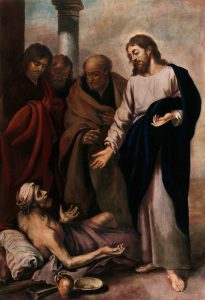The Jubilee of the Sick and Health Care Workers is a sign of hope for the sick and an opportunity to express our gratitude for healthcare workers who care for and accompany others in such a vulnerable time.
PRAYER
Blest are you, God of the Universe,
You sent your Son, Jesus, among us.
We thank you and praise you for His presence with us even now.
May His example guide us in showing compassion for the sick, the suffering and infirm.
Help us to understand those we come to serve and to reach out in love to them.
Bless our caregivers with patience, mercy and compassion.
Inspire them with insight to minister to all people with loving kindness.
May they be your compassionate presence
and share the peace of your Holy Spirit with everyone they meet.
Bless and reward our generous caregivers and their families with happy hearts.
We ask you this through our Lord Jesus Christ your Son, who lives and reigns with you in the unity of the Holy Spirit, God, forever and ever.
Amen.
(Adapted by Sr Mary Christa Kroening OSB via the Catholic Health Association of the United States)
TEACHING

From Pope Francis’ Message for the 33rd World Day of the Sick (February 11, 2025):
“How can we be strong, for example, when our bodies are prey to severe, debilitating illnesses that require costly treatment that we may not be able to afford? How can we show strength when, in addition to our own sufferings, we see those of our loved ones who support us yet feel powerless to help us? In these situations, we sense our need for a strength greater than our own. We realise that we need God’s help, his grace, his Providence, and the strength that is the gift of his Spirit (cf. Catechism of the Catholic Church, 1808).
“Let us stop for a moment to reflect on how God remains close to those who are suffering in three particular ways: through encounter, gift and sharing.
“When Jesus sent the seventy-two disciples out on mission (cf. Lk 10:1-9), he told them to proclaim to the sick: “The kingdom of God has come near to you” (v. 9). He asks them, in other words, to help the sick to see their infirmity, however painful and incomprehensible it may be, as an opportunity to encounter the Lord.
“More than anything else, suffering makes us aware that hope comes from the Lord. It is thus, first and foremost, a gift to be received and cultivated, by remaining “faithful to the faithfulness of God”, in the fine expression of Madeleine Delbrêl (cf. La speranza è una luce nella notte, Vatican City 2024, Preface).
“How often, when we care for those in need, do we discover love! We realise that we are ‘angels’ of hope and messengers of God for one another… whether patients, physicians, nurses, family members, friends, priests, men and women religious, no matter where we are, whether in the family or in clinics, nursing homes, hospitals or medical centres.
“We need to learn how to appreciate the beauty and significance of these grace-filled encounters. We need to learn how to cherish the gentle smile of a nurse, the gratitude and trust of a patient, the caring face of a doctor or volunteer, or the anxious and expectant look of a spouse, a child, a grandchild or a dear friend. All these are rays of light to be treasured.”
TESTIMONY

“I have been blessed to have entered a profession that has been so rewarding. Every patient walks into a hospital vulnerable. A blood test or scan report changes the course of one’s life forever. In my world, this vulnerability is accentuated by a visible horizon. Some come with acceptance,
many ambivalence, and not too infrequently, we meet denial. To face one’s mortality requires a tremendous amount of courage. Uncertainty and existential anguish fuel demoralisation and despair. The elixir of hope is critical, and many in health care fail to appreciate that they are the vessels of hope.
“My constant exposure to the dying reminds me of our divine filiation: the fact that we are daughters and sons of God is a basic truth in the economy of salvation. In a single moment, with the drawing of the last breath, life gives way to death. It is quite a privilege to witness this moment as a family member or clinician. To consider our divine filiation is to become aware of the reality of our situation and to live in the light of God our Father. Divine providence—God’s watching out for us with the love of a Father.”
– Associate Professor Natasha Michael, former Director of Palliative Medicine at Cabrini Health (Text from Melbourne Catholic; image from Cabrini Health)
PRAYERS OF INTERCESSION
Loving God, we hold in your healing presence those who suffer pain and ill-health. Bring them healing and hope through the care of their friends, family and medical professionals.
We pray to the Lord.
Loving God, we hold in your healing presence those who suffer in mind and spirit, and all who care for them. Give them courage and strength in their endurance.
We pray to the Lord.
ADDITIONAL RESOURCES
Health Care and the Church’s Mission (Bishop Michael E. Putney), 2004.
Creative Commons Licence
The text of this publication is licensed under a Creative Commons Attribution – NonCommercial – Share Alike 3.0 Australia Licence. Please attribute this publication to the Bishops Commission for Evangelisation, Laity and Ministry, November 2024.
This resource may be reproduced or photocopied in its entirety or in part. No copyright fee is payable.